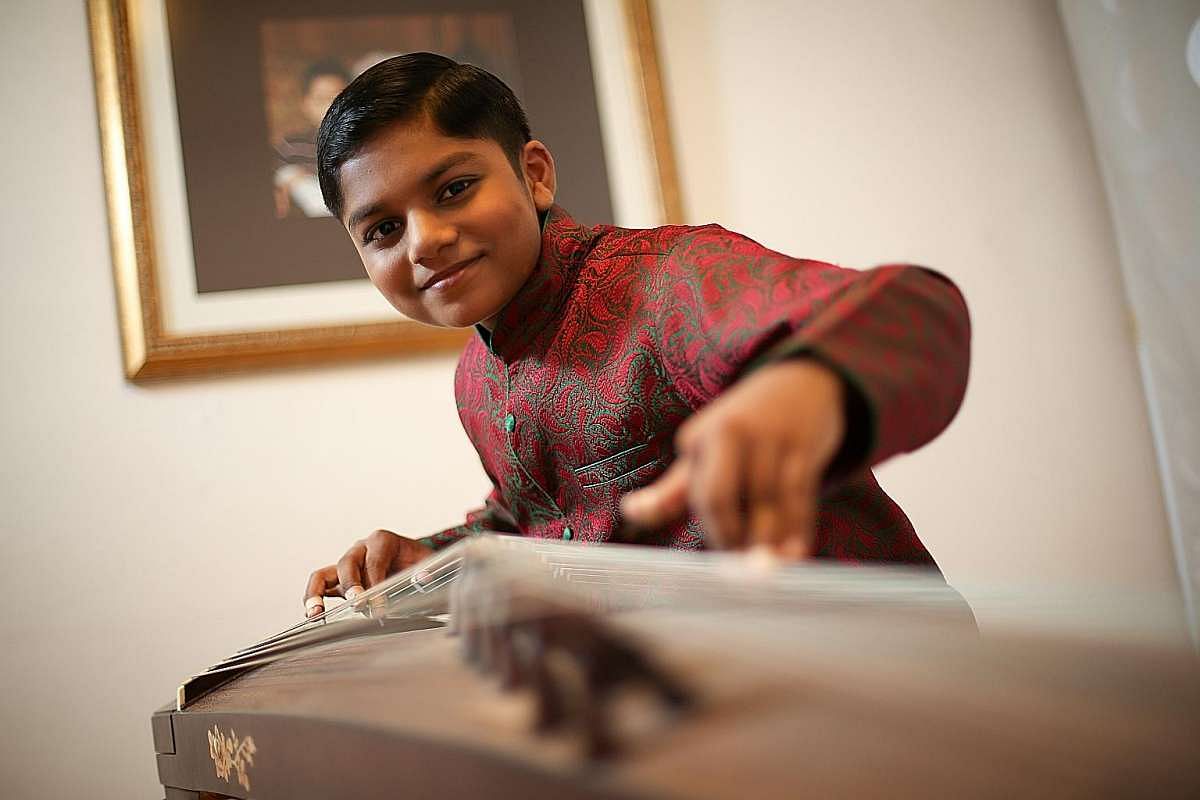A HEART FOR OTHER ARTS
A heart for other arts
Meet some Singaporeans who are keen on the cultures of other ethnic groups

Chinese brothers play Indian classical instruments
Brothers Krsna Dasa Tan Guo Ming and Radha Govinda Dasa Tan Guo Jun did not pick up the Indian sitar and tabla by choice.
Their father, Mr Tan Thiam Teck, 58, had converted to Hinduism in the 1980s and learnt to play the instruments from Indian masters during the 10 years he lived on and off in India. He then taught elder son Krsna the sitar and his younger boy Govin the tabla.
Mr Tan, a former engineering technician who goes by his Hindu name Krsna Lila Dasa, says: "I wanted to share something I love very much with my children, not so much to make musicians out of them."
Krsna, 26, who is married with one child, is a full-time musician.
Govin, 23, who is single, is doing a bachelor of arts degree in music at Lasalle College of the Arts.
Daughter Caitanya, 28, plays the piano and works as an actress and host in musical theatre.
Their housewife mother, 58, is a Chinese who also converted to Hinduism.
Krnsa says his father was very strict about practice. Once, when he was seven, his father made him practise through the night as he thought the boy had not practised that day.
In 2001, he prepared for the National Indian Music Competition organised by the National Arts Council by practising three to four hours each day. He won the 2002 competition in the sitar open category at the age of 12.
Krsna says: "It was a turning point for me. I saw that hard work and discipline do pay off. I became more serious about playing the sitar."
Govin began learning the tabla, a percussion instrument, from his father when he was 12, after trying out instruments including the guitar and sarod (a stringed instrument). He came in first in the 2006 and 2008 National Indian Music Competitions, in the Tabla Junior and Open categories respectively.
The brothers started performing together at various venues when they were in their teens. They are now part of a band called Flame Of The Forest, which also include a bassist, violinist and keyboardist.
In recent years, they have ventured into playing world fusion music, which blends musical traditions from around the world, on their Indian instruments. They play world fusion music on the sitar and tabla in their debut self-titled album, which was released last year.
Krsna, who enjoys playing heavy metal, rock 'n' roll and the blues on his sitar, says: "A musical instrument actually has no boundaries. It's people who put boundaries on it."
Their father is happy with the direction they are taking in music. He says: "I've always told them to keep up with the times and stay relevant. Learn the tradition, but don't be boxed up by it."
Erhu is like people humming a song

"I tell them, the guitar is a Western instrument but nobody questions when a Malay or Chinese plays it. I don't see why it should be any different with the erhu."
The 27-year-old picked up the two-stringed instrument by chance.
She can speak, read and write Chinese

Her parents then switched her to Malay at Primary 3. But the Singa- porean Indian, now in her 50s, was always keen to rekindle her love of the language.
About seven years ago, she decided to sign up for private Chinese classes at Ikoma Language School.
Passionate about the guzheng

Now 12, the boy, who goes by one name, says: "I was about six then. The sound felt perfect to me."
His uncle took him to more of such concerts, but Taran did not learn the name of the 21-stringed Chinese musical instrument until he was in Primary 3. He had signed up for the guzheng co-curricular activity at St Hilda's Primary, thinking it was a sport like wushu.
Juz-B sang Mandopop before Shila Amzah did

Shila became well-known in China in 2012 when she won Asian Wave, a Chinese reality singing show. In 2014, she came in third in I Am A Singer 2, another Chinese singing competiton.
But Juz-B - comprising seven members in their 20s and 30s from different professions - had already wowed Chinese audiences with their performances of Chinese songs, beginning in 2004 when they went to Taiwan for an Asian collegiate a cappella competition.
Join ST's Telegram channel and get the latest breaking news delivered to you.
A version of this article appeared in the print edition of The Sunday Times on April 10, 2016, with the headline A heart for other arts. Subscribe
